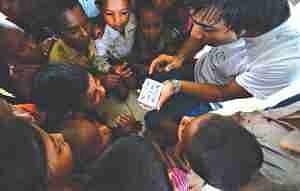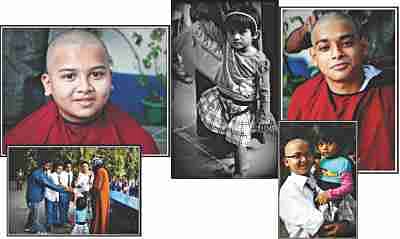Street Magic in Bangladesh
Last week, my boss told me I had to interview David Blaine the magician if I wanted to get my paycheck signed. This was kind of a small problem since the man was a thousand miles away and I was stuck here in Dhaka. So I put in some extra work hours and travelled to Chittagong where I met the most famous street magician there and interviewed him like the efficient worker I was. So here's Farhanul Islam, better known as Magicman Farhanul.
 RS: How did your magical career begin? (Geddit? geddit?)
RS: How did your magical career begin? (Geddit? geddit?)
Magicman: When I was about 15, I used to be a big fan of street magic shows shown on TV, especially on AXN. Magicians like David Blaine used to make my day better. I was so fascinated by magic that I used to watch it regularly and grew a love for it. So as they say, love can take you anywhere. I started doing some childish card tricks and realised that it amazed people. I began taking a deck of cards everywhere and showed tricks to people. Sometimes I would meet amazing people who taught me new stuff. As I visited new places, I found people who knew a little magic too and we traded each others work so that we both learned something new. After turning professional four years back, I started creating my own tricks and became a maestro of what I do. I never stopped watching street magic on TV, though; as that's where I learnt about the importance of presentation and types of magic. I used to get into new crowds all the time and create tricks according to crowd demand.
RS: How popular is street magic in Bangladesh?
Magicman: When I started, there were very few professional street magicians here that performed inside crowds. But it is becoming more popular day by day as new magicians get into street magic.
RS: Are there no professional institutions teaching magic?
Magicman: There is one in Dhaka, but I don't think they teach street magic. Rather, stage magic, which is a lot easier than street magic. No one can teach you street magic. You have to master it by yourself, going into crowds. A street magician can become a stage magician easily but a stage magician can't become a street magician that easily because for street magic you have to make your own style and get used to the crowd surrounding you. A crowd around you is harder to deceive than a crowd sitting far away.
RS: When did you do your first official show?
Magicman: I did my first TV show last year in Channel I for a group called Rono. I performed in many many places like AISD, BYLC, 1 Degree Initiave, Bangabondhu Convention Centre, in a conference in Thailand and so on. My shows are mainly for charity. I founded a charity group called “We kill cancer and bring magic into people's lives,” which frequently organises fund raising events for cancer patients. I don't get more time for more shows as I have studies to take care of. When I performed in Thailand, there were people from 80 different countries watching me. I believe that is a huge accomplishment.
RS: How do people react to the shows?
Magicman: The people here make me love street magic even more. I just get back to the crowd because the noise they make is a big kick. So every single time I go for street magic, I make sure that every person goes home with their minds freaked which makes their day better, the way the street magic in TV used to make my day better. And I am sure I am able to motivate them in their daily life by showing them that everything is possible. I get so happy when I get to hear people tell me that they want to be a street magician like me too.
By Neshmeen
Magic vs Cancer
 “We kill cancer and bring magic in people's lives” is a cancer group founded by Mohammed Farhanul Islam, an ex-student of Chittagong Grammar School. The group focuses on unique fund-raising activities for individuals suffering from cancer. Their first cancer project was for a patient named Afra, done through a T20 inter-school charity cricket tournament held on February 2010 where schools from both Dhaka and Chittagong participated.
“We kill cancer and bring magic in people's lives” is a cancer group founded by Mohammed Farhanul Islam, an ex-student of Chittagong Grammar School. The group focuses on unique fund-raising activities for individuals suffering from cancer. Their first cancer project was for a patient named Afra, done through a T20 inter-school charity cricket tournament held on February 2010 where schools from both Dhaka and Chittagong participated.
Last Monday, 12th December 2011, the group organised its second project for Labiba Muntaha, a young girl suffering from blood cancer. The first ever "November head shaving fund raising event" involved students voting for individuals who they wanted to see with their heads shaved in a tribute to all the cancer patients in the country. The two students with the maximum votes, Mashrur Hoque, a 9th grader and Inan Inteshar, an 8th grader then negotiated with the group that only if they succeeded in raising a minimum of Taka 1 lakh 20 thousand for Labiba, would they shave their heads in front of a large crowd at school. In just less than two weeks, a total amount of Taka 1 lakh 38 thousand had been raised and distributed to Labiba as the two brave men said goodbye to their precious locks of hair. Hundreds of students cheered them on as Labiba and her mom stood watching with excitement.
Cutting Corners the Hard Way
 Anxiously waiting for SAT scores, running around for recommendations, groaning over terrible transcripts, working on ten different essays at once what's going on? Uni apps abroad is going on.
Anxiously waiting for SAT scores, running around for recommendations, groaning over terrible transcripts, working on ten different essays at once what's going on? Uni apps abroad is going on.
Some of you have gone through it before, most of you haven't, and for the latter group, you're in for some surprises. It's not as easy as it sounds, and it certainly isn't so easy that you should wait until the last minute to start, or presume to think you know what you're doing. Because unless you've done it before, there are a hundred and one things you wouldn't know about the complicacies surrounding the process. Which, by the way, and no pressure or anything, will determine your future (read: fate). We can't help you find shortcuts, because there aren't any. What we can do, however, is provide you with some solid information that might make the ride less… painful.
Selecting country and college
A year ago, this wouldn't have mattered quite as much, but global economy has not exactly been stable. Studying abroad is, first and foremost, expensive. Keep in mind the economy crisis of USA. The amount of aid they will give is less than when your cousin or your friend's sister went abroad three years ago. There is a growing possibility that the UK might decline entirely to give work permits to international students, and while Australia will gladly hand out aid to graduate students, opportunities for undergraduate students are low. Calculate your costs before selecting an expensive university, but also remember that financial aid is rarer, not unavailable. Just because you have to keep your dreams realistic doesn't mean you have to give up on them.
Also, state universities don't usually give FinAid to international students. They give scholarships. Check over everything carefully, and you'll notice loopholes.
It's 50% luck
Believe it or not, this is true. There's a huge 'maybe' hanging on your admission. So don't hesitate to go for something that appears unrealistic. Also, don't bank on one particular college, no matter how likely your prospects are. Most importantly, ignore collegeboard statistics.
The Common Application
If you're looking to study abroad, you should be aware by now that a large number of colleges in the States use the Common App as a general application form. Each college takes a certain fee when you submit the application, ranging from roughly $50-90. A fee waiver can sufficiently lower your costs, but it's best not to use one for every college. It would be advisable to avoid using fee waivers when applying to your backup colleges.
The essays are a vital part of the application, but you probably knew that. What's also important is your ECA. It doesn't matter how insignificant it seems to you. List it. Recommendations? Make sure you add plenty of oil to be certain you get a good one.
Even the subject you choose is important. Think twice before clicking 'Undecided'. The Chinese are never undecided. Yes, that's who you're competing against. The Chinese and the Indians also have money. They're running way ahead. You need every leeway you can get.
UCAS
Let's call this the UK version of the Common App. It is much easier to handle, but you only have one major recommendation source, and only one essay. This essay needs all your attention.
Mailing transcripts
Things get lost in the m ail. Sometimes they take forever to get there. Unless it's necessary, applying online is more reliable. However, teacher recs and transcripts will probably have to take to the airways anyway.
Since we live so, so far away, colleges will give you some extra time to send in transcripts and the rest of your paper trail. If you're applying online, don't panic to sort your paperwork out right now. The mail has to be sent before the deadline; it can reach the Admissions Office two weeks later. This is a possible advantage you should use only if there is no other choice. Don't take unnecessary risks out of laziness. If you can get it done and have the mail delivered in time, do it.
DHL and FedEx are two dependable mediums for applying abroad. They both have discounts for student applicants, and there are further conditional discounts for customers who've used their service more than once. DHL, for instance, will give you a fee cut of approximately 30% if you're an applying student sending stuff to a college. There are additional discounts based on how much you spend and how many times you've used DHL. Don't pay the full over-3000 taka fees.
And finally, use your resources
Use others' experiences to your advantage. Learn from their mistakes. You can't go wrong.
By Professor Spork
